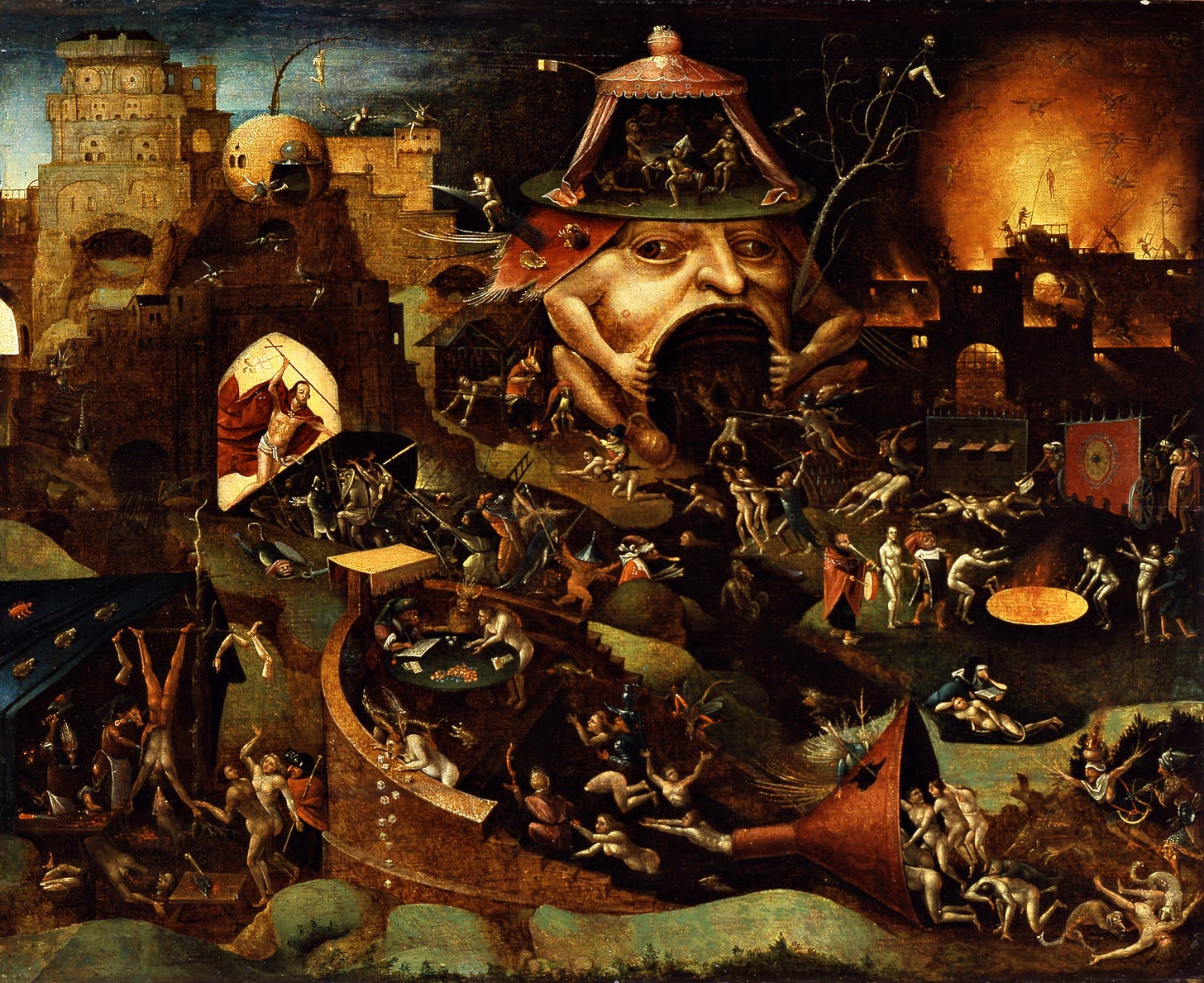It seems I’ve embarked on a Crime & Punishment series.
First came the men who behave badly and remain relatively unscathed. (Heavy on the crime; light on the punishment.)
Now I’ll dabble in some Limbo, where you just linger vaguely in the in-between, not living, not dying, not happy, but forever longing. (Levels of crime and punishment up to interpretation.)
Forthcoming, because I find the number 9 so enticing: the rings of Hell. (Which itself spirals out someday into a building/breaking series on the structure and destruction of worlds and underworlds.) And then, to a different kind of afterlife that may come when the vilest of criminals get rewarded as if with virgins in heaven: often when serial murderers finally get jailed, soon arrive the crazed fangirls and lovers...
But first let’s do the limbo.
Limbo is a state of uncertainty, according to the Oxford dictionary: “an uncertain period of awaiting a decision or resolution; an intermediate state or condition.”
Limbo is also the art of sliding gracefully under a horizontal pole, like the Queen of Limbo in video below, Shemika Campbell, who like her mother and grandmother before her is “carrying on the traditionally Trinidadian form of dance. Shemika is keeping up the family legacy, taking limbo to a whole new low. She has set three Guinness World Records, including the record for lowest limbo at only 8.5 inches.”
Then we come to the famous Limbo of Dante.
Limbo is the first ring of Hell as depicted not in the Bible (nary a mention there of any Limbo) but in great length and detail in the Inferno-themed first third of Dante Alighieri’s Divina Commedia, or Divine Comedy. The narrative poem dating between 1308 and 1320 depicts Dante as his own main character guided by Roman poet Virgil through the three realms of the Inferno, Purgatorio, and Paradiso. Inferno is the book I own and earmarked ad nauseam in college, so I’ll revisit it and its art in more depth next time.
The Library of Babel newsletter I recently discovered has an essay that fixates, even fetishizes, the very first ring of the first section, with, “Why I’d actually prefer to be sent to the first circle of hell than to heaven” by Chen Malul.
Limbo, Chen claims, isn’t much of a punishment at all, but rather an awesome place to settle in indefinitely to hobnob with the intellectual elites of ancient history.
In the 33 Cantos of the Inferno, we encounter, among many others, a man who carries his severed head as others might carry a lamp; two lovers who were swept by uncontrollable passion in life but are now whirled and swept by an unceasing storm; heretics who denied the existence of a soul and are buried in burning graves, while others, the traitors, drown in a frozen river. Every sin receives its metaphorical punishment in Dante’s vision.
That is the principle of the Contrapasso. It is the one “law of nature” that applies to hell, stating that for every sinner’s crime there must be an equal and fitting punishment.
However, and this is crucial, not all circles of hell are created equal. In fact, for me at least, there is one that can even be considered attractive—a place I would rather go to, perhaps even preferring it to the possibility of entering Eden.
Limbo, in the Inferno, feels odd because it seems to punish, even if meagerly compared to all the way worse rings of Hell ahead, those who objectively don’t deserve it. Stuck here are simply the grown folks who, through no choice of their own, lived before Christianity or the babies who died before baptism.
In my version, translated by Allen Mandelbaum in 1982, Dante describes this liminal space on the brink of the “melancholy valley” of the underworld:
In truth I found myself upon the brink
of an abyss, the melancholy valley
containing thundering, unending wailings,
That valley, dark and deep and filled with mist,
is such that, though I gaze into its pit,
I was unable to discern a thing
While there’s the murky threat of “thundering, unending wailings” below, here in the first ring, it’s more about subtler sighing:
the sighs arose from sorrow without torments,
out of the crowds—the many multitudes—
of infants and of women and of men.
The kindly master said: “Do you not ask
who are these spirits whom you see before you?
I’d have you know, before you go ahead,
they did not sin; and yet, though they have merits,
that’s not enough, because they lacked baptism,
the portal of the faith that you embrace.
And if they lived before Christianity,
they did not worship God in fitting ways;
and of such spirits I myself am one.
For these defects, and for no other evil,
we now are lost and punished just with this:
we have no hope and yet we live in longing.”
Great sorry seized my heart on hearing him,
for I had seen some estimable men
among the souls suspended in that limbo.
So clearly this rules out the bad hombres I was talking about last time (the unholy trinity of OJ, Trump, and Weinstein), who might better fit in other rings of “real” Hell reserved for those who “refused to atone for their sins while alive.” However, since two out of three of these men are still alive, you could argue that life itself is Limbo, a waiting game where they must always wonder when the other dirty shoe will drop.
From Dostoevsky’s Crime and Punishment:
If he has a conscience he will suffer for his mistake; that will be punishment—as well as the prison.
The key word here is “if.” Any suffering of this sort of self-made prison requires a conscientious I’m not sure these dudes have. When they assert their innocence against their “witch hunt” sitch do they actually believe it? You might argue men of this ilk are simply sociopaths with no moral compasses, and therefore no guilt, no secret underlying bad feeling. Or are these feelings so repressed in a severely hidden lock box they are truly lost? Do they dupe us with their great deception and cynicism, or worse: themselves?
According to Catholic theology, Limbo was the border between Heaven and Hell, the space between the ultimate reward and punishment, but has grown out of favor. According to this Irish professor who conducted a poll in his country:
Professor Kennedy explained: “The term Limbo does not appear in the Bible or the New Testament. It seems the concept was developed over time by Christians to handle two problems: one was the fate of those who led just lives and who died before Christ came on earth to redeem humankind; the other was the fate of unbaptised babies in the event of death.
“Children growing up in the Ireland of the 1950s will have a clear remembrance of a metaphysical space or place known as Limbo. For Catholics, though not Irish Protestants, this formed part of a spiritual cosmos which viewed Heaven and Hell as opposite poles, with Purgatory and Limbo occupying rather vaguely defined intermediate positions. But Limbo appears to have disappeared off the spiritual map.”
I had assumed Purgatory and Limbo were just synonyms for the same place, but there’s a ring of Hell called Limbo and a whole separate place called Purgatory in Dante’s depiction. So what is the difference?
Dante’s version of Purgatory is extraordinarily detailed and, in some key respects, strikingly original. First, he imagines Purgatory as being divided up into seven terraces, each one corresponding to a vice (in the order that Dante sees them: Pride, Envy, Wrath, Sloth, Avarice and Prodigality, Gluttony and Lust). On each terrace, there is a slightly different form of suffering: the envious, for instance, have their eyes sewn up; the proud are weighed down by stones. The range of forms of suffering is therefore considerably greater.
But perhaps the most original aspect of Dante’s version of Purgatory is that the souls in Purgatory are in the process of moral change. They suffer, but not simply in order to repay a debt: they are suffering in order to become good. The consequence of this is that they willingly undergo the suffering, they understand the reasons for it, and they are acquiring the new habits of thought which will enable them to go to Heaven. For Dante, Purgatory is not only a place where you pay the debts you incurred when you sinned: it is in fact the place where you reflect on those sins, and where you change the psychological tendencies which led you to sin. This leads to extraordinary richness in the depiction of character. Whereas, in the Inferno, the sinners met by Dante tended to be fixed in the habits of thought which led them to sin, in the Purgatorio Dante faces the challenge of depicting souls who are in a process of change.
As sad a borderland as it appears to be at the entrance of Hell, Limbo is still decidedly Hell with no redemption available for the poor souls and baby souls who aren’t Christians. No real damning, and no saving either. But here in Purgatory, punishment comes with possible relief—everyone in theory is Heaven-bound.
Limbo offers no such promise.
Colloquially we might think of limbo as neither here nor there. And, when both options suck, as the state of being “trapped between a rock and a hard place.” The other metaphoric scene to set this is “between the devil and the deep blue sea,” care of Homer’s Odyssey. From Dictionary.com:
Also, between the devil and the deep blue sea or Scylla and Charybdis. Between two equally difficult or unacceptable choices. For example, Trying to please both my boss and his supervisor puts me between a rock and a hard place. The rock and hard place version is the newest of these synonymous phrases, dating from the early 1900s, and alludes to being caught or crushed between two rocks. The oldest is Scylla and Charybdis, which in Homer’s Odyssey signified a monster on a rock (Scylla) and a fatal whirlpool (Charybdis), between which Odysseus had to sail through a narrow passage. It was used figuratively by the Roman writer Virgil and many writers since. The devil in devil and deep blue sea, according to lexicographer Charles Earle Funk, referred to a seam around a ship’s hull near the waterline, which, if a sailor was trying to caulk it in heavy seas, would cause him to fall overboard. Others disagree, however, and believe the phrase simply alludes to a choice between hellfire with the devil and drowning in deep waters.
And such is the journey we face in this mortal coil of life, no matter your faith in an afterlife or literary preferences. You could impatiently fixate on your painful condition at any moment in this perennial passage between difficult states, or you can just try to stay present and embrace the—relatively serene—limbo of unknowing.
Also, don’t caulk your boat in heavy seas.







I did not know of this core difference between purgatory and limbo. Thanks for clearing it up! (Also there is the Heaven of Animals where my mom may well be [today is her birthday] because as a child her Sunday school teacher told her animals don't go to heaven, so she made a deal with God that if He'd provide a heaven for the animals she would gladly take care of them all.
“That valley dark and deep and filled with mist, is such that though I gaze into its pit, I was unable to see a thing”
I was taken to the top of the Empire State Building when I turned 21 and was told to spit by a wise older friend, he told me what i see is limbo and that life begins after……….. He was a different type of dude but….
I don’t know ……. if the two are connected this quote hits home